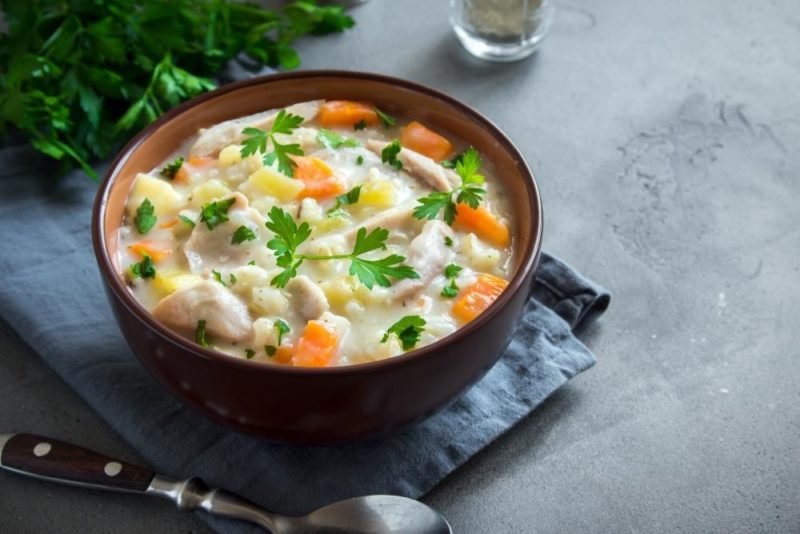
This is the seventh post in a 10-part series looking at the principles of Intuitive Eating. Last week’s post was on Principle 6: Feel Your Fullness.
Do you struggle with emotional eating — occasionally, sometimes or what feels like ALL the time? Have you beaten yourself up over it, or tried hard to squash your tendency to use food to soothe? You may be interested in this little tidbit: before the current edition of “Intuitive Eating,” Principle 7 was called “Cope With Your Emotions Without Using Food.” Today, it’s known as “Cope With Your Emotions With Kindness.”
Why this shift? Because the reality is that sometimes, using food to soothe your stress or uncomfortable emotions is the kindest choice — and sometimes it’s not. That makes trying stamp out emotional eating altogether very diet-culturey. Ironic, given that dieting itself can trigger emotions, which ultimately leads to using food as your primary coping mechanism for dealing with those feelings.
I’ve had clients who went through therapy for emotional eating and were assured the entire time that once they “cured” their emotional eating, they would suddenly lose weight. Well, that didn’t happen, and while exploring how we use food emotionally is valuable, that value lies not in weight loss, but in learning more effective ways to find calm or comfort when we need it.

A brief client example
Mary had very strong emotional eating tendencies stemming from childhood, when food was her only source of comfort in a household with an emotionally distant father and a mentally ill mother. We’d been working together for a while when she told me she’d had a very difficult week. She wanted to eat for comfort on a surface level, because that had been her go-to for decades, but to her surprise, she discovered that deep down, she really didn’t want to.
It occurred to her that when she was dieting, which she had done her entire adult life, she was never fully, properly nourished with enough food to feel comfortably full. This was partly because she was unable to honor her hunger and had a million food rules thanks to the food police. So by being constantly underfed she was extremely vulnerable to stress, and would not just eat, but overeat, to comfort herself.
Once she started consistently nourishing herself with both food and joyful activities, she became more resilient to stress — plus, she identified other ways to comfort herself when things get tough.

The emotional eating continuum
Emotional eating isn’t the same for everyone, and it takes different forms.
- Sensory gratification, or pleasure, is the mildest feeling that food might produce, and this is a normal part of living.
- Eating foods for comfort can be part of a healthy relationship with food, if you do it while staying present, and without guilt.
- Continuing down the continuum, many people use food as a distraction from feelings they choose to not experience. Using food in this way can be a problem, because it blocks your ability to detect your intuitive signals.
- A more serious form of emotional eating is using it as sedation, to numb yourself. Some people call this a “food coma.” This keeps you from feeling your feelings for an extended length of time, and it also makes it impossible to notice cues of hunger or satiety.
- If you’ve never experienced it, the idea of eating for punishment sounds odd, but it definitely happens. If you find yourself eating very large quantities of food in an almost angry, forceful manner that leaves you feeling beaten up, I want you to know that you are not alone. I had a young client a few years ago who revealed to me, after I gently questioned her a bit, that she did this, and when I told her that this was actually a thing, and it wasn’t just that something was horribly wrong with HER, she was shocked. She really thought that she was broken.

Emotional eating triggers
Emotional eating triggers are plentiful, but here are some of the most common ones:
- Boredom and procrastination. In other words, eating to fill the time or put off doing tasks you don’t really want to do.
- Bribery and reward. The roots of this often start often in childhood. For example, when you’re offered a cookie after you fall down and skin your knee, or a cake when you get good grades. In adulthood, it can look like this: “I worked hard today, I deserve a cupcake.”
- Excitement. Literally using food to add excitement when life gets dull.
- Soothing. Eating to feel better when you’ve had a tough day.
- Love. Showing yourself — or others — love through food.
- Frustration, anger and rage. If these are your triggers, you may find that you seek out crunchy or hard foods.
- Stress. Stress is a major trigger for emotional eating, however, the biological problems caused by stress (increased levels of stress hormones, increased blood pressure, etc.) are made worse if you also overeat due to stress. It’s worth noting that dieters often use stress as an excuse to “blow their diets.”
- Anxiety. When you feel butterflies in your stomach, this can make you want to eat.
- Mild depression. The desire to feel better and have more energy can prompt you to seek a boost from food.
- Being connected. The desire for personal connection can affect how and what we eat when we’re enjoying food in a social setting.
- Loosening the reins. For some people, overeating is the only mechanism they have for letting go of the tight reins of control in the rest of their life.

Questions to ask yourself
No matter where you fall on the continuum, no matter what your personal emotional eating triggers, coping with emotional eating starts with asking yourself these questions:
- First, ask yourself, “Am I biologically hungry?” If the answer is yes, then honor your hunger and eat!
- If the answer is “no,” then ask yourself, “What am I feeling?” This isn’t always easy to answer, so you may need to write it out or talk to someone, or simply sit with the feelings and experience them, if that’s comfortable for you. I’ve included some handouts in your worksheet packet that include lists of feelings, which can be helpful when you’re trying to figure out exactly what YOU are feeling.
- Then, because many people eat to fulfill unmet needs, ask yourself, “What do I need?” If you identified that you’re bored, you may need some entertainment or stimulation. If you identify that you are feeling anxious, what you may need is to feel more calm. If you are feeling lonely, you may need social connection, even if it’s over the phone.
- Then, ask for help if you need it, or use one of your other coping tools. Depending on what you’re feeling, this may mean watching a funny movie, going for a walk to get a change of scene or blow off some steam, working on a jigsaw puzzle or reading a good book to distract yourself, or meditating or listening to calming music to feel less anxious. That’s just a few examples, of course!

Meeting your needs without food
When you are stressed, upset, lonely or dealing with other uncomfortable emotions, your need to feel “less bad” is a genuine and legitimate need. If your feelings are unbearable, and food is the only tool you have to help you cope, then thank goodness if you have food. But sometimes, the kinder choice is to find alternative means of coping. For example:
- Seek nurturing by, for example, playing with your dog or cat, taking a relaxing walk or a bubble bath, spending time gardening, doing some yoga, or simply resting and relaxing.
- Deal with your feelings by acknowledging what’s bothering you. Allowing your feelings to come up reduces your need to push them down with food.
- Find a different distraction. A research study from several years ago randomized participants to two groups. Both groups were shown an emotionally stressful film, then one of the groups was given access to food, while the other was not. The group with food access engaged in emotional eating, and obviously the other group couldn’t. In the end, both groups felt better in the same amount of time, which demonstrates that it’s time, not food, that matters when we want to feel a bit better. So finding a non-food way to distract yourself while you ride out the clock can be helpful.
The bottom line is that emotional eating both helps and hurts. Here’s a simple, yet insight-provoking exercise you can do. Take a piece of paper, and:
- On one side, write down the ways in which using food emotionally serves you
- On the other side, write down the ways in which using food emotionally disserves you

The (maybe) surprising benefits of emotional eating
While there are real benefits to finding non-food ways to cope with stress, boredom and emotions, it’s also important to consider What happens when food is no longer important for comfort and soothing?
- You don’t have the benefits of using food, which can be sad. Plus you’re stuck experiencing your feelings.
- And, those feelings may feel stronger because you’re not covering them up, which nudges some people to seek counseling as a way to finally process them.
Aside from the fact that for some people, some of the time, food is the only tool available to make unbearable feelings feel not SO unbearable, emotional eating can have another surprising benefit—it can serve as a red flag that something is going on.
It can be a clue that your life is unbalanced with too many responsibilities, too little relaxation, or that something is just not quite right for another reason. It may seem strange, but in this way, the urge to eat emotionally can be a gift, if you notice the urge, then ask yourself the am I hungry, what am I feeling, what do I need questions.
As I mentioned when I talked about the emotional eating continuum, emotional eating isn’t a problem when you use food to nurture yourself in a constructive, healthy way. This includes choosing foods that truly satisfy you, as well as things like chicken soup when you’re sick or hot cocoa when the weather outside is dreary. It’s when you move down the continuum that it’s important to probe deeper about what’s going on, bringing in the trifecta of compassionate self-awareness, curiosity and non-judgment.
Next post: Principle 8: Respect Your Body.
This post contains Amazon Affiliate links. As an Amazon Associate I earn from qualifying purchases.
Disclaimer: All information provided here is of a general nature and is furnished only for educational purposes. This information is not to be taken as medical or other health advice pertaining to an individual’s specific health or medical condition. You agree that the use of this information is at your own risk.
Hi, I’m Carrie Dennett, MPH, RDN, a weight-inclusive registered dietitian, nutrition therapist and body image counselor. I offer compassionate, individualized care for adults of all ages, shapes, sizes and genders who want to break free from eating disorders, disordered eating or chronic dieting. If you need to learn how to manage IBS symptoms with food, or improve your nutrition and lifestyle habits to help manage a current health concern or simply support your overall health and well-being, I help people with that, too.
Need 1-on-1 help for your nutrition, eating, or body image concerns? Schedule a free 20-minute Discovery Call to talk about how I can help you and explore if we’re a good fit! I’m in-network with Regence BCBS, FirstChoice Health and Providence Health Plan, and can bill Blue Cross and/or Blue Shield insurances in many states. If I don’t take your insurance, I can help you seek reimbursement on your own. To learn more, explore my insurance and services areas page.
 Print This Post
Print This Post






